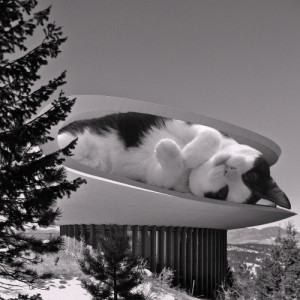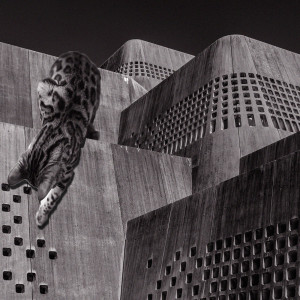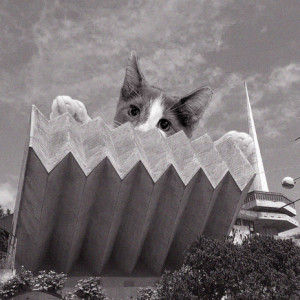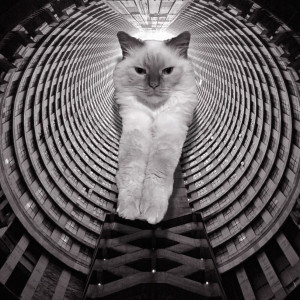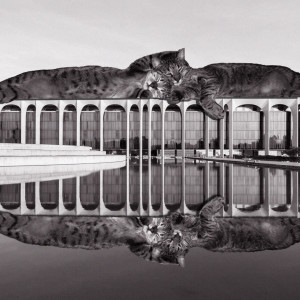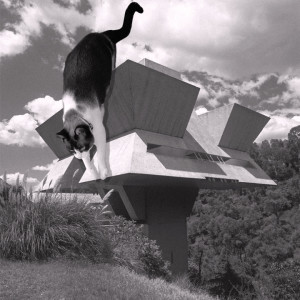If You Build It, Cats Will Come
What happens when you juxtapose curvy cats and blocky buildings? Meet the architecture buffs behind IG sensation Cats of Brutalism.
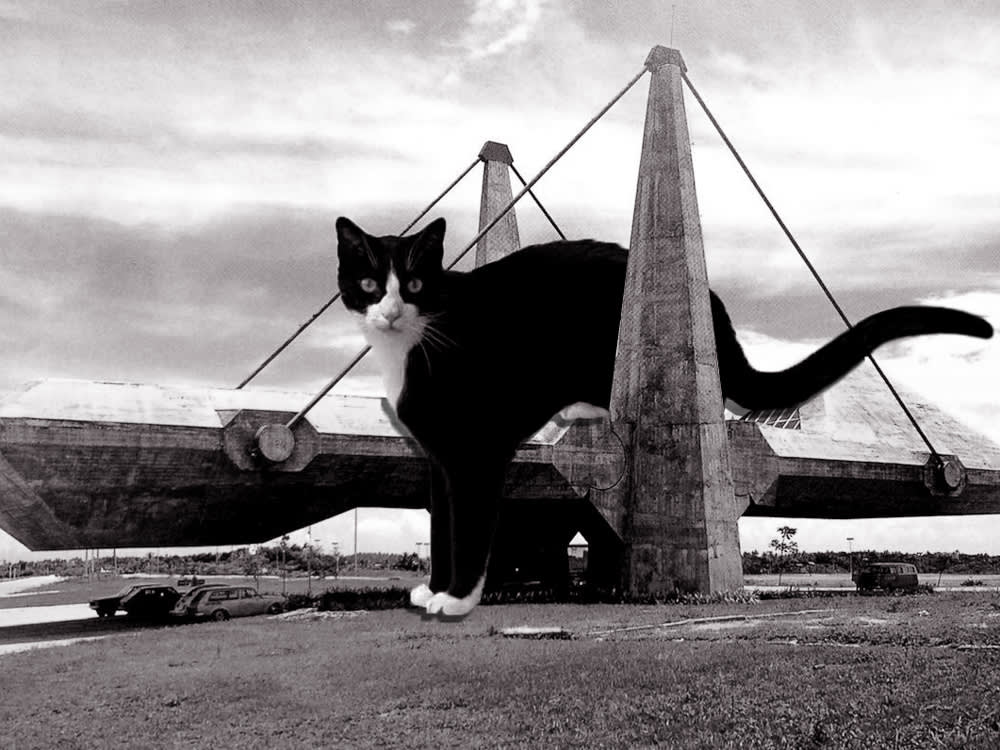
Share Article
The two elements were hiding in plain sight, waiting for some visionary to sense their potential harmony as a union. Cats and Brutalist architecture — mmm-wah! Emily Battaglia, Madelaine Ong, and Michaela Senay, architecture grad students at the University of Buffalo, found this magic combination as they sought to raise awareness of certain imperiled post-war structures. On a lark, they posted a photo of Senay’s Tabby, who she’d enlarged and set on the roof of Paul Rudolph’s dramatic 1969 Earl W. Brydges Library.
The synthesis of soft feline lines with stark corners and huge footprints caught fire in the crosswinds of cats and Internet, and in December, The New York Times named Cats of Brutalismopens in a new tab one of “5 Art Accounts to Follow on Instagram Now.” Zooming in from Buffalo, Battaglia, Ong, and Senay share their experience curating an exceptionally elegant meme — Senay against a dark background from which a black, green-eyed cat seems to appear and vanish, Cheshire-like, on her lap.

Get (totally free) deals for food, treats, accessories, tech, and way more pet parenting must-haves.
opens in a new tabMichaela, who’s that with you?
Senay: This is Smith. He’s a black Domestic Shorthair. I have two cats, Smith and Bailey, who I found on Bailey Road. Bailey is the one we first Photoshopped onto Paul Rudolph’s library at Niagara Falls. We’d been brainstorming ideas to promote these buildings and we wanted to do something besides just posting the architecture itself.
Battaglia: In adding the cats, we were hoping to show the playful side of it, and to reach a community that might not have an architecture background. To open their eyes to this creative style.
Senay: After my cats, we started using cats that were up for adoption. And we still will, putting up photos from the cat rescue Ten Lives Clubopens in a new tab and some local organizations like the Buckminster Cat Caféopens in a new tab.
What made you feel that Brutalism needed preservation?
Battaglia: It’s coming up on its 50th year of existence and we realized a lot of these buildings were up for discussion, receiving a lot of negative feedback from the community and a lot of people wanting them taken down. We wanted to show that Brutalism isn’t just these giant concrete blocks — there’s actually a lot of different unique forms that I don’t think people realize are Brutalist buildings.
Would you ever consider other pairings of style and animal? Dogs of Rococo? Parrots of Beaux Arts?
Battaglia: The Dogs of Modernism!
Ong: The Dogs of Deco.
Do you have to nix certain suggestions because they aren’t Brutalist?
Battaglia: We’ll get a lot of buildings that aren’t close. And you have to sort of put those to the side, which we do feel bad about, but just focus strongly on Brutalism or the characteristics of Brutalism.
Many of your posts have cats whose owners have submitted them. Have you gotten any particularly memorable cats?
Senay: We had a hairless one. A White Russian female climbing on Dusan Dzamonja’s 1969 Spomenik Memorial in Bosnia-Herzegovina. This person actually created their own photo and we posted it in November.
Have you found any techniques that sort of speed things up?
Battaglia: The more unique the pose is, the more attractive the post will be. If there’s a cat that’s actually playing or interacting with the building, that’ll be more successful compared to a cat just sitting on the building.
Do any Brutalist structures resemble scratching posts?
Battaglia: Oh, we’ve found a few!
Have you found any brutal cats?
Senay: I made one post for this guy who rescues cats that have — if you want to call them — disabilities. This one had three legs. And the way I Photoshopped it, people were asking, like, “Does it not have a fourth leg?”
Battaglia: We have one where the cat’s claws are out and he’s biting the building. That’s pretty brutal.
Senay: I forgot about that one!
Do you all have cats? Or are some of you dog people?
Senay: I have two cats. Maddy and Emily don’t have cats.
Ong: I’m neutral.
Battaglia: I have two dogs. But this has actually made me more appreciative of cats. It’s shown me that cats are more playful than I’d thought they were. I actually enjoying seeing people’s cats playing in their cute cat posts. I’m not gonna lie, a year ago, I wouldn’t have!
In 2006, some architects in Boston were trying to change the name of brutalism to heroic architecture.
Senay: I get that like the name ‘Brutalist’ makes it seem harsh. But I feel like it kind of goes with the design itself. It is kind of a harsh design.
You were curating a major hashtag during the pandemic. Did anyone ever try to pull you into political discussions?
Senay: Thankfully, no. At most, we’ll get the occasional person who doesn’t like Brutalism or doesn’t like cats. One person actually said, “This building would be better without cats on it.” Which is, like, the whole reason for the site.
�

Chris Norris
Chris Norris is a writer, reporter, author, and longtime companion to West Highland terrier Gus, recently departed but intensely loved. Chris Norris is has written for The New Yorker, New York Magazine, The New York Times Magazine, Rolling Stone, GQ, Details, and NPR’s “All Things Considered.” He lives in New York City with his wife and 10-year-old son.
Related articles
![Cat artwork created by Wild Masterpieces]() opens in a new tab
opens in a new tabWild Masterpieces Is Bob Ross Meets Sears Portrait Studio
The artist behind these amazing pet portraits talks special-needs animals and unconventional commissions. P.S. There’s a discount code!
![Gerrard Gethings]() opens in a new tab
opens in a new tabCats, Dogs, and Drag Queens — Through the Lens of Gerrard Gethings
The photographer talks about his Border Terrier assistant, the likeness of people and their pets, and going behind the scenes with drag queens.
